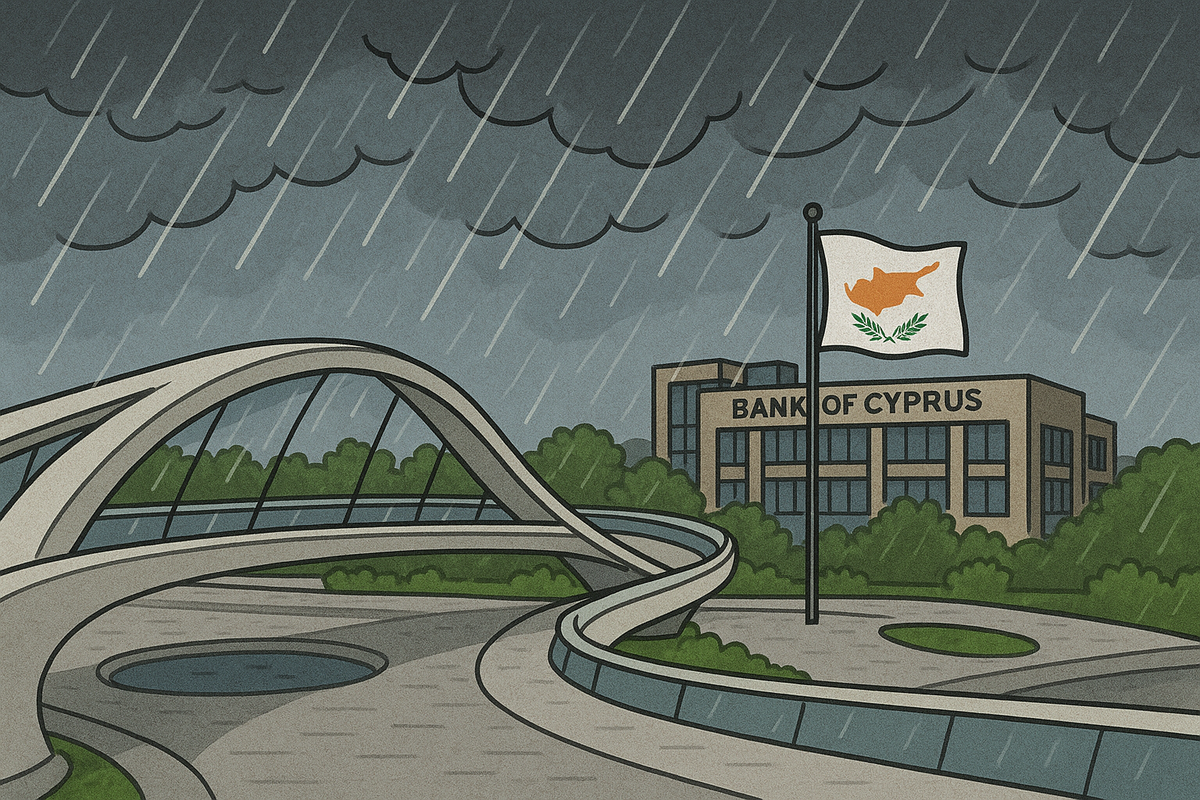
By Miika Makela | WBN News Global, WBN News Europe , WBN Finance| Sept 25, 2025 | CANADA
The Cypriot financial crisis of 2012–2013 was one of the sharpest examples of austerity and fiscal discipline imposed in the eurozone. Unlike Portugal or even Greece, Cyprus was forced into a bailout program that came with a radical and unprecedented twist: the bail-in of depositors. Ordinary citizens and businesses discovered overnight that their bank savings were not safe, as part of their deposits were seized to stabilize the financial system.
This extraordinary step, combined with traditional austerity measures such as tax hikes, privatizations, and public sector cuts, reshaped Cyprus’s economy and left a lasting mark on its society. The episode remains one of the starkest warnings of how crises can directly impact households and their bank accounts.
Background to the Crisis
Cyprus’s crisis was rooted in three interrelated vulnerabilities:
- Oversized banking sector: At its peak, the Cypriot banking system was seven times the size of the national economy, heavily exposed to foreign deposits (particularly Russian) and Greek government bonds.
- Exposure to Greece: The 2012 Greek debt restructuring inflicted massive losses on Cypriot banks, which held billions in Greek bonds.
- Weak fiscal discipline: Years of deficits left the government ill-prepared to rescue its financial sector without external help.
By 2012, the banking system was insolvent, and the state itself was locked out of bond markets. A bailout from the European Union and International Monetary Fund was inevitable.
Core Austerity Measures
When Cyprus requested financial assistance, the Troika (EU, ECB, IMF) agreed to a €10 billion bailout in March 2013. In exchange, Cyprus implemented sweeping austerity measures and the infamous bail-in.
The Bail-In of Depositors
- Seizure of deposits: Depositors at the two largest banks, Laiki Bank and Bank of Cyprus, were forced to absorb losses.
- At Laiki Bank, uninsured deposits above €100,000 were effectively wiped out as the bank was wound down.
- At Bank of Cyprus, large depositors had nearly 50% of their balances converted into equity to recapitalize the institution.
- Capital controls: To prevent bank runs, the government imposed limits on withdrawals, transfers abroad, and even the cash citizens could carry when leaving the country.
This was the first time in eurozone history that private depositors were made to directly fund a bailout.
Fiscal Austerity
- Public sector wage cuts: Salaries for civil servants were reduced, and promotions and hiring were frozen.
- Pension reforms: Retirement age was raised, and benefits were trimmed.
- Tax hikes:
- VAT increased from 17% to 19%.
- Corporate tax rose from 10% to 12.5%.
- Higher property and fuel taxes introduced.
- Privatizations: State-owned enterprises in telecoms, ports, and energy were earmarked for sale.
Social Spending Cuts
- Welfare programs were cut, with stricter eligibility requirements.
- Health and education budgets were trimmed, producing staff shortages and reduced services.
Direct Impact on Citizens
Depositors and Bank Accounts
The most striking difference between Cyprus and other crisis countries was the direct hit to deposits.
- Families and businesses with more than €100,000 in the bank saw huge portions of their savings vanish overnight.
- Many small and medium-sized businesses, which used banks as working capital accounts, faced collapse because their funds were frozen or confiscated.
- Households scrambled to adjust as capital controls restricted daily life—withdrawals were capped, and overseas transfers were prohibited without government approval.
Incomes and Employment
Public sector employees endured wage cuts of up to 20%, while the private sector suffered layoffs and reduced hours. Unemployment surged above 15% in 2013, a record for Cyprus.
Rising Poverty
The sudden contraction in banking and tourism—the twin pillars of the Cypriot economy—led to a collapse in domestic demand. Poverty rates increased sharply, and many families relied on extended kin networks for survival.
Social Strain
Capital controls created a climate of insecurity and humiliation. Citizens queued daily at ATMs for limited withdrawals, while businesses were unable to pay suppliers abroad. The sense of betrayal was profound: deposits once considered safe under EU guarantees were now fair game for crisis management.
Economic Outcomes
Short-Term Shock
- GDP contracted by 6% in 2013 and another 2% in 2014.
- Domestic demand collapsed as households cut back sharply.
- Investment dried up as confidence in the banking system evaporated.
Stabilization
- By 2015, Cyprus was slowly recovering, aided by tourism and foreign investment in real estate.
- Fiscal deficits narrowed significantly, and the government exited its bailout program in 2016, earlier than expected.
Long-Term Effects
- Cyprus’s reputation as a financial hub was permanently damaged.
- Trust in the banking system never fully recovered.
- The precedent of deposit bail-ins raised fears across Europe about the safety of savings in any future crisis.
Criticisms of the Austerity Path
- Destruction of Confidence: By targeting deposits, the Troika undermined the fundamental trust that citizens place in banks. The damage to Cyprus’s financial credibility was enormous.
- Disproportionate Burden: Ordinary savers and small businesses carried the cost of bank recapitalization, while political elites and well-connected insiders often managed to shield their wealth.
- Overreliance on Tax Increases: Higher VAT, property, and corporate taxes strained households and businesses at a time of economic contraction.
- Privatization Controversies: Strategic assets were sold under pressure, often at depressed values, raising questions about long-term sovereignty.
Conclusion
Cyprus stands as the most extreme eurozone austerity case because citizens’ bank accounts were directly targeted. While Portugal and Greece endured wage and pension cuts, Cypriot households watched their savings vanish overnight under the bail-in.
The bailout program eventually stabilized the state’s finances and allowed Cyprus to exit crisis mode within a few years, but the social and psychological scars remain. For many citizens, the crisis destroyed not only their savings but their trust in the financial system and in European guarantees.
The lesson is clear: austerity in Cyprus was not just about belt-tightening. It was about turning citizens’ private deposits into instruments of fiscal repair. For households, it was a brutal awakening to the reality that in a crisis, even bank savings are expendable.
Miika Makela, CFA
LinkedIn: http://bit.ly/46shFb1
#Cyprus Crisis #Eurozone #Bail In #Austerity #Financial Crisis #Banking #Economic Policy #Theft #European Economy #Depositors
Editor for WBN: Chris Sturges
Subscription to WBN and being a Contributor is Free.


